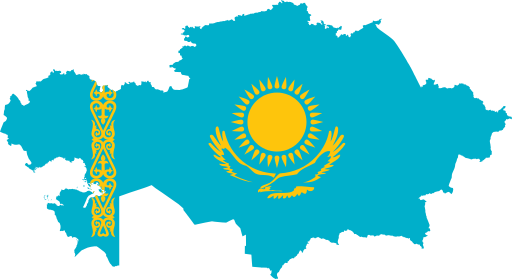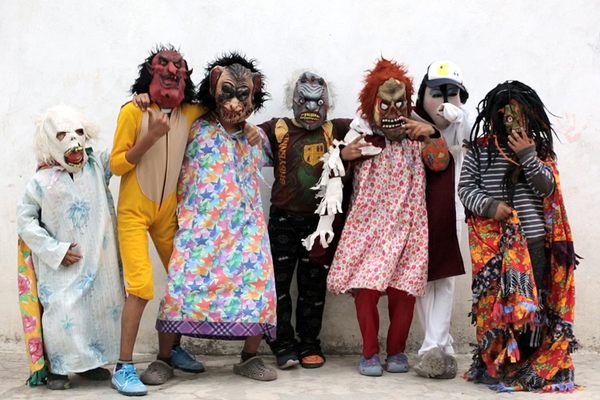Meet the Most Famous Michigander in Kazakhstan

Louis Albertini’s time in Kazakhstan has brought with it unexpected fame. (Photo: Louis Albertini)
Twenty-six year-old Michigander Louis Azamat Albertini has been interviewed by Kazakhstan’s Esquire magazine, featured on national television, and sought out by catwalk models.
Kazakhs are fascinated by Albertini, a young professional who looks distinctly like one of them despite being raised elsewhere. Barely 24 years old, the nation of Kazakhstan still feels largely invisible to the world. The idea that an American can fit in so effortlessly among them is both surprising, and perhaps, validating.
Albertini was born to Kazakh parents in Voronezh, Russia, in November of 1989, just two weeks after the fall of the Berlin Wall, the turning point in a revolution that would soon spread to his birthplace. In 1992, a year after the momentous dissolution of the Soviet Union, he was adopted by an American family at the age of three, his birth name Azamat shifting to his middle name.
Albertini arrived in Kazakhstan in August 2015, but knew little about the country before stepping off the airplane to start a job in marketing and communications for KIMEP University in Almaty through the fellowship program Princeton in Asia. He’d studied Russian and Economics in college, spent two summers in Russia and a few days in Kazakhstan, and met a few Kazakh students studying on scholarship in the U.S., but that was about it.
Kazakhstan, which gained independence in 1991, is the ninth-largest country in the world by geographical size. The nation of around 17 million people has had the same president since its founding, and its economy—which thrives on oil—is the biggest in Central Asia. The official languages are Russian and Kazakh, and ethnic groups include Uighur, Turkish, and Tartar peoples, as well as Russians, Uzbeks, and Ukrainians.

Albertini with the camera crew for one of Kazakhstan’s national television channels after filming. (Photo: Louis Albertini)
The Esquire interview came about when a writer overheard Albertini and a Kazakh friend of his chatting at a bar. She was confused as to why they were speaking English, because she thought they were both Kazakhs, and later messaged him to ask whether he’d be willing to do an interview.
In the interview, Albertini talks about his adoption and childhood and what it’s like to feel both foreign and local. The piece went up at 9 a.m. on a Wednesday in late October. When Albertini logged onto Facebook an hour later, he had over 200 friend requests, 100 new messages, and around 600 new notification alerts.
The U.S. embassy in Astana, the capital of Kazakhstan, and the U.S. consulate in Almaty, the country’s largest city, shared the article. When Albertini went to the supermarket later that day, a girl called his name and asked for a selfie with him. Messages continued to come in for the rest of the week—people saying how they live in the U.S. but are raising their Kazakh kids American, a Kazakh who recently moved to Grand Rapids. People even messaged in Russian saying things like, “You are the brother I’ve never had.”
“It’s kind of intense. I just got shared all around,” says Albertini. The interview quickly became one of most popular stories in the history of Esquire Kazakhstan.
 Can you name three things you know about Kazakhstan? (Image: Stasyan117/WikiCommons CC BY-SA 4.0)
Can you name three things you know about Kazakhstan? (Image: Stasyan117/WikiCommons CC BY-SA 4.0)
People tell Albertini that his story is inspirational, and say they admire him for trying to explore his heritage, saying that his choice to come to the country was very profound. “I don’t see it like that,” he says. “I haven’t really done anything but literally go to Kazakhstan.” The whole thing has been a surreal experience, he says.
In Grand Rapids, Michigan, where he grew up, people tended to think Albertini was half Japanese, or maybe half Korean. People just didn’t really know anything about Kazakhstan, he says. “A lot of older people just think it’s an extension of the Soviet Union, or it’s somehow related to Pakistan.”
Mentioning the travel writer Pico Ayer’s TED talk, “Where is Home?”, Albertini says that one geographic coordinate doesn’t tell the whole story. He uses his public speaking invites, like a broadcast for the consulate and a presentation for Pecha Kucha, a platform similar to TED, to share the idea of being able to identify yourself in multiple ways at the same time. A lot of people in Kazakhstan, he says, still see identity as very black and white.
When he spends time with white Americans of European origin in Almaty, Albertini can immediately see the attention that foreigners, in particular expats, receive. If Albertini keeps his mouth shut (and isn’t recognized), he’s ignored, blending right into the background. Once, when Albertini was explaining that he’s American, one guy responded, “No you’re not.” The guy then pointed to Albertini’s lighter-skinned friend and said, “He’s American.”

Saken Seifullin, a pioneer of modern Kazakh literature. Ethnically ambiguous, n’est-ce pas? (Image: Public Domain/WikiCommons)
Albertini was totally thrown off. “It kind of ruined the night for me,” he says. He’s even had other Americans tell him that his English is really good. Instead of being embraced as a fellow countryman, he’ll get thoroughly interrogated about where he was born and where he’s from. The small comments chip away at him, he says.
“When I first came to this country, I was like—I’m an American in Kazakhstan. And now it’s like, if I’m an American but everyone sees me as something else, where is that balance then? I now feel a little less American, to tell the truth, and more Kazno-American, or Americanistan, I don’t know.”
When Albertini’s Italian-American mother recently visited Almaty, locals assumed that she was some important business woman and Albertini was just ushering her around. Cab drivers and merchants would speak to him in rapid Russian, referring to his mother as his “boss” and giving him quizzical looks when he called her “Mom.”
These days, Albertini has been getting more and more involved in the local startup culture. He’s been thinking about creating an informational entrepreneurship advocacy platform that can connect local Kazakhstan startups with U.S. investors, or even starting up a local necktie business. His increased visibility has given him connections and opportunities that would have been impossible three or four months ago, such as the chance to pitch an idea to the vice-minister of finance and development in Astana.
Fame aside, Louis Azamat Albertini’s time so far in Kazakhstan has exposed that most folks, Kazakh, American or otherwise, struggle with identities that don’t fit into neat categories.










Follow us on Twitter to get the latest on the world's hidden wonders.
Like us on Facebook to get the latest on the world's hidden wonders.
Follow us on Twitter Like us on Facebook